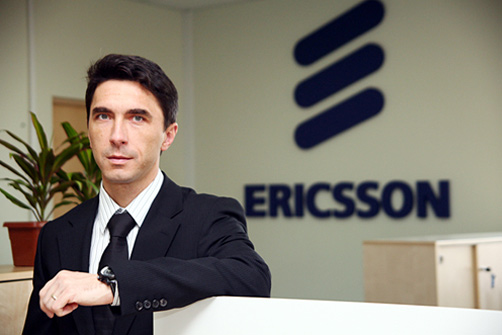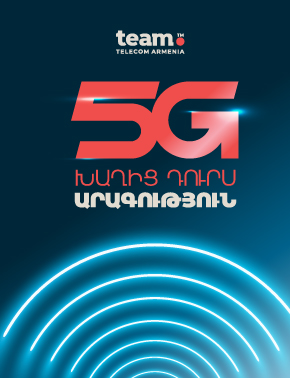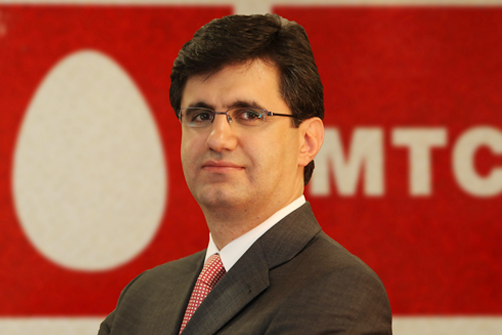-

General Director of Ericsson in Armenia Olaf Parasiewicz
11:45 | 27.12.10 | Interviews | exclusive 11684
“New opportunities for realizing joint projects open up for us”
Exclusive interview of General Director of Ericsson in Armenia Olaf Parasiewicz to Mediamax and Itel.am portal
- On October 21, Ericsson office opened in Armenia. Can you please speak about the main activity directions of the office?
- To my mind, the recent opening of our office in Armenia is a bright example of Armenia’s and our local partners’ significance for Ericsson. Generally speaking, for the global activity of Ericsson, the entire region, covering the countries of Central Asia, is of strategic priority. The potential of the country and the entire region in general is very serious.
One should state that in the recent years we have become witnesses of impetuous development of the telecommunication market in Armenia. This powerful dynamics and first of all the impetuous growth in the number of mobile connection subscribers and internet users contributes to expansion of our business activity in the region.
If we speak of directions of our work in Armenia, we are first of all based on the needs and the agenda of our partners - operators. Undoubtedly, this is mobile and landline connection, mobile and landline broadband access, convergent services, IP television and innovative services for the networks of new generation.
- The talks about the fact that Ericsson can open an office in Armenia had been in process for a few years. Did this become a key factor for making the decision?
- Ericsson Company has quite long and successful experience of cooperation in Armenia with leading operators in the country. I will try to be more specific: we have been functioning in Armenian market since 2007, when the first contract for supply of equipment for landline network was signed with our partner “ArmenTel”, which enters “VimpelCom” Group of Companies. Recent opening of the new office is an evidence of the fact that the business of our partners in Armenia is developing successfully and this means that new opportunities for realizing joint projects open up for us.
Today, due to Ericsson solutions and hard work of the Armenian operators, we can fully use the advantages of communication means and be active participants of the global information network. We hope that our company will be able to offer in Armenia not only the best solutions in their class, but also enthusiasm, knowledge and professional experience, which will help the country keep pace with the time in the sphere of telecommunication technologies.
- At the opening it was stated that Ericsson office opening in Armenia will become a new step in development of long-term partnership with leading operators of the country. What does long-term partnership imply? What particular forms will it have?
- In the past few decades, numerous paradigms have changed in our industry. Let’s recall that in mid-twentieth century, just like in the beginning of the century by the way, the industry of communication dealt with connecting physical objects to the “wire”. Or simply speaking, it connected places: buildings, private houses, apartments, phone booths. With the arrival of mobile connection, the paradigm of the sector changed: we started connecting people. Due to such a significant change, this year the industry marked a serious landmark: the number of mobile connection users on the planet exceeded 5bln. Ericsson believes that in the nearest decade, we will face another change of paradigm: we will start connecting everything that surrounds us, meaning objects: not only gadgets, although gadgets as well, but also everything that can benefit from being connected to mobile network and internet. We are sure that only in ten years we are going to speak of not 5, but already of 50bln “connected” people, places, objects.
At the beginning of the 20th century, when people thought of electricity, they imagined “light” and even bulbs. But if we look at it now, we are surrounded by thousands of objects, connected to electric networks. All of them make our life simpler, more convenient, more effective. We believe that the same thing will happen in the nearest future concerning mobile networks as well.
However this will be impossible without closer interaction of all interested parties: operators, suppliers, developers of software support, companies from various industries – from transport to banking, where the advantages of “connection” are still to be realized in practice. In order to achieve our ambitious goal, we need a new paradigm of relations between the participants of numerous technologic chains – long-term interaction and cooperation; we need new business models. Ericsson both at the global level and the local one here in Armenia invites all existing and potential partners to further dialogue and elaboration of new business models.
- From big players in Armenia, Ericsson works with VivaCell-MTS and ArmenTel-Beeline mobile connection operators and Ucom internet provider. Could you, please, present the peculiarities of cooperation with each of those players?
- As I have already stated, the launch of active work of Ericsson in Armenia took place in 2007, when “ArmenTel” chose Ericsson as the exclusive supplier of equipment and services for building a convergent network of new generation on the basis of IP Multimedia Subsystems (IMS) solution. As a result, the operator can offer its subscribers convergent services, access to which is realized both from the landline and the mobile networks of connection.
Also in 2007, our company launched cooperation with “VivaCell-MTS” mobile connection operator. And our interaction is now actively developing. In particular, this year we became partners in testing 4G/LTE network, and this is a very serious achievement for Armenia, which in a second entered the list of the most advanced countries of the world as to development of new generation networks. And we, undoubtedly, are grateful to our partners from “VivaCell-MTS” for the opportunity to jointly develop a project of such importance.
In 2009, Ericsson signed an agreement with Ucom Company for supply of IPTV complex solution, technology of fiber-optical connection to the house GPON and telephony on the basis of IMS system, which allowed the operator providing access to broadband internet, landline telephony and high quality interactive TV for viewers in Armenia. It is not a secret that traditional broadcasting television in the recent years is, to say the truth, on the edge of a certain crisis, first of all, conceptual. The modern viewer expects from TV the same level of interactivity, as he/she enjoys in the Net: they want freedom, convenience and endless choice of content. We believe that the future belongs to digital IP television, since this is what will allow realizing in practice the concept of interactive, practically endless choice of television in terms of width.
- Development of IT and broadband access is one of the priorities of governmental policy in Armenia. Can Ericsson company plan a role in stimulating IT development in Armenia by means of realizing research, educational and other programs?
- Of course, we are interested in participating in such projects. I can even say that through our partners in Armenia we already participate in those processes.
In the past years, hundreds of researches have been realized all over the world, which aimed at studying the influence of the telecommunication industry on economy and the societies of various countries. So, the overwhelming majority of them revealed two important factors. First of all, there is a stable relation between the level of broadband internet penetration and the speeds of economy growth. The country receives on average one percent of stable GDP growth for each 10% of increase in broadband internet access penetration. And secondly, each thousand new connections to broadband internet access provide the society on average with eighty new workplaces.
Why does all this happen?
First of all, there is direct effect on the economy from development of telecommunication industry. In developed economies, direct investment of ICT industry in GDP may reach a few percents. Important is the fact that ICT and telecommunications today represent production and transfer of knowledge and this means not only large-scale investments in building networks, but also investments in the future – the opportunity to produce more knowledge, demanded in the world market. And obviously, this is also increase in knowledge, incomes of the population and as a result – solvency of demand for goods and services from the part of citizens, who will have increased their level of income.
Secondly, these are also indirect effects, conditioned by the multiplicative effect of ICT sector and connection. It is not a secret that penetration of mobile connection and broadband internet access is one of the factors of labor productivity growth. Communications speed up exchange of information and decision- making. And this is one of the bases of modern competitive economy.
In addition, development of connection is one of the key factors of attracting foreign investments. Thus, speaking for the investment community, leaders of Indian states, for instance always speak of their airports, roads, the level of education and penetration of connection and fast internet. And this is natural: mobile connection and broadband internet access is one of the necessary conditions for work in general for large global companies. And economy starts speeding up even more due to inflow of investments.
Finally, access to the Net gives the society the chance to even faster develop human capital, increase the level of education, use modern technologies of education, connect to big knowledge labs and participate in elaboration of most advanced technologies of the future. This is also a chance to keep most prospective scientists and technologists inside the country, protecting oneself from brain drain.
In general, Ericsson is sure that development of modern communications gives the economy and the society new impulses for dynamic growth and this means that it makes our daily work meaningful.

17:29 | 24.09.25 | Articles
Jacopo Losso on Cross-Border Investments and Why Armenia Attracts Angels








